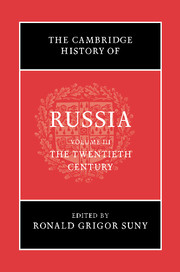Book contents
- Frontmatter
- Introduction
- 1 Reading Russia and the Soviet Union in the twentieth century: how the ‘West’ wrote its history of the USSR
- Part I Russia and the Soviet Union: The Story through Time
- 2 Russia’s fin de siècle, 1900–1914
- 3 The First World War, 1914–1918
- 4 The revolutions of 1917–1918
- 5 The Russian civil war, 1917–1922
- 6 Building a new state and society: NEP, 1921–1928
- 7 Stalinism, 1928–1940
- 8 Patriotic War, 1941–1945
- 9 Stalin and his circle
- 10 The Khrushchev period, 1953–1964
- 11 The Brezhnev era
- 12 The Gorbachev era
- 13 The Russian Federation
- Part II Russia and the Soviet Union: Themes and Trends
- Bibliography
- Index
- References
13 - The Russian Federation
from Part I - Russia and the Soviet Union: The Story through Time
Published online by Cambridge University Press: 28 March 2008
- Frontmatter
- Introduction
- 1 Reading Russia and the Soviet Union in the twentieth century: how the ‘West’ wrote its history of the USSR
- Part I Russia and the Soviet Union: The Story through Time
- 2 Russia’s fin de siècle, 1900–1914
- 3 The First World War, 1914–1918
- 4 The revolutions of 1917–1918
- 5 The Russian civil war, 1917–1922
- 6 Building a new state and society: NEP, 1921–1928
- 7 Stalinism, 1928–1940
- 8 Patriotic War, 1941–1945
- 9 Stalin and his circle
- 10 The Khrushchev period, 1953–1964
- 11 The Brezhnev era
- 12 The Gorbachev era
- 13 The Russian Federation
- Part II Russia and the Soviet Union: Themes and Trends
- Bibliography
- Index
- References
Summary
The immediate afterglow of the failed coup attempt in August 1991 must rank as one of the more optimistic periods in Russian history. In August 1991, like many other times in Russia’s past, Kremlin rulers had issued orders to suppress the people. This time around, some of the people resisted. For three days, a military stand-off ensued between those defending elected representatives of the people in the White House – the home to Russia’s Congress of People’s Deputies – and those carrying out orders issued by non-elected leaders in the Kremlin. Popular resistance to the coup attempt was not widespread. In fact, except for Moscow, St Petersburg and the industrial centres in the Urals, there were no signs of resistance at all. But this concentrated opposition, especially in Moscow, produced major consequences for Russia’s history. In this round of conflict between the Russian people and their rulers, the people prevailed. The victory created an atmosphere of unlimited potential. One Western publication declared, ‘Serfdom’s End: a thousand years of autocracy are reversed’.
The triumph, however, also fuelled inflated expectations about what was to come next. The victors immediately accomplished some symbolic gestures, such as the arrest of the coup plotters and the destruction of Feliks Dzerzhinsky’s statue outside the KGB’s headquarters. But the bigger tasks of creating a new state, economy and polity soon erased the euphoria of August 1991 for Russia’s political leadership. Russian President Boris Yeltsin, the unquestioned hero of the dramatic August events, most certainly seemed overwhelmed.
Keywords
- Type
- Chapter
- Information
- The Cambridge History of Russia , pp. 352 - 380Publisher: Cambridge University PressPrint publication year: 2006



